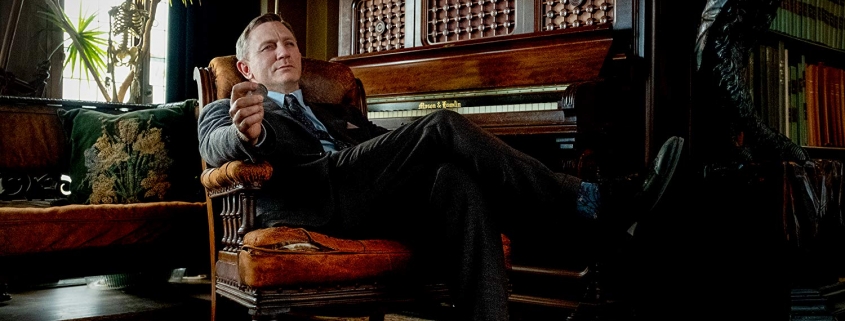REVIEW: ‘Knives Out’ pays homage to classic mysteries, adds new twists

Writer-director Rian Johnson isn’t content with making generic, run-of-the mill films. As controversial as “Star Wars: The Last Jedi” may be, there’s no disputing that Johnson wasn’t interested in making a conventional “Star Wars” film. Not at all. With “Knives Out,” Johnson once again takes the standards of a classic genre — the whodunit — and subverts them for an innovative, thrilling ride.
After the sudden death of renowned mystery novelist Harlan Thrombey (Christopher Plummer), detective Benoit Blanc (played by Daniel Craig with an exquisite Kentucky accent) is asked through an anonymous letter to figure out who is responsible for Thrombey’s death. Everyone in the family is a suspect in his murder.
Joni Thrombey (Toni Collette) realizes who Blanc is, saying, “I read a tweet about a New Yorker article about you.” Lines like this cement the time in which the Thrombeys live in. Their residence does resemble the classic era of mystery novels: with bookshelves casting a looming presence as they reach the ceiling and a wide assortment of knives circulating around a chair.
However, they don’t live in the classic era of whodunits from the ’60s and ’70s. This is a family that argues about the Trump administration, Harlan’s son Walter (Michael Shannon) wants to sell his dad’s TV rights to Netflix for millions and Joni makes her living as a lifestyle “influencer,” whatever that means.
Despite the modern setting, Johnson still pays homage to the murder mysteries of Agatha Christie, as Blanc attempts to uncover each clue and question every suspect, no matter how innocent or guilty they appear to be. Contradictory accounts of what happened the night of Harlan’s death make Blanc “suspect foul play.” The Thrombeys can’t even be trusted in recounting an argument. They can’t stand to be perceived as unlikeable.
Johnson isn’t completely opposed to the cat-and-mouse game that has worked in the past. He pits Blanc against the Thrombeys in their elaborate mansion for much of the film — a standard in mystery films to create tension between the characters. He’s just more interested in finding new ways to work within an already established genre.
The Thrombeys comprise a star-studded cast that also includes Jamie Lee Curtis, LaKeith Stanfield, Chris Evans and Katherine Langford. The most surprising part of “Knives Out,” aside from all its intricate plot twists, is how much of a backseat the Thrombey clan takes. Even Blanc, the lead investigator, isn’t the main character through which we experience the movie.
That role falls to Marta Cabrera (Ana de Armas), an immigrant whose sincerity stands out (through a literal biological inability to lie) among the narcissistic and entitled Thrombeys. Concern over receiving their portion of the will produces more concern and worry than resolving what happened to one of their very own. Harlan’s own forged success spoiled the rest of the family into being dependent upon his wealth.
A running gag occurs in which the family can’t seem to remember which country she was born in — a different Latin American country is mentioned each time. It’s a subtle reminder of the unconscious prejudices and insincerity the family truly exudes. The challenges that the wealthy Thrombeys face pales in comparison to those of Marta, who lives in a small apartment fearing for the well-being of her undocumented mother.
As effective as Johnson’s class commentary is, there are still a few moments where the inclusion of politics and pop culture is a bit too on the nose. It’s not that the lines themselves aren’t witty or comedic — they are, but they reek of surface-level social commentary intended to be culturally relevant compared to the better executed commentary exhibited in Cabrera’s plot line. For example, Richard Drysdale (Don Johnson), Thrombey’s son-in-law, makes a reference to the musical “Hamilton” with the line “Immigrants: They get the job done.” It shows that the family doesn’t understand Marta’s genuine fear of deportation, but it’s impact falls short compared to when Drysdale pretends to care for her, only to hand her a dirty plate without even looking at her. These small gestures of hypocrisy do more than a throwaway pop-culture reference.
“Knives Out” first and foremost excels as an intricate mystery film. That’s what audiences are going to want: the unexpected turns. They want to be the detective alongside Blanc, guessing who the culprit may be. The twists along the way, for the most part, never appear to be simply for shock value. As keen as audiences are in trying to figure out a film before it’s over, with “Knives Out,” it’s better to just let the film play out and reveal itself.
It’s apparent that Johnson planned out every meticulous detail and twist to ensure they serve the plot first before anything. Alongside cinematographer Steve Yedlin’s close-up shots of the characters and tendency to linger on certain objects, the film is both a visual and textual achievement in engaging its viewers.
Straying away from the CGI, big-budget spectacle that is the “Star Wars” franchise, Johnson reverts to a classic yet innovative murder-mystery tale. The quest to find out who killed the patriarch of the Thrombey family and why they did so unravels into a film about how kindness and honesty go a long way in a country exploited by material and societal wealth. But, if you aren’t interested in all the subtext, “Knives Out” works just as well as a thrilling film that’ll keep you guessing until the very end.


